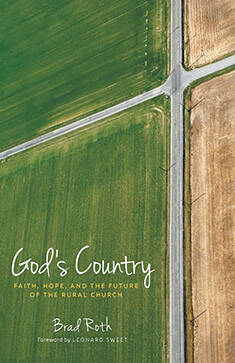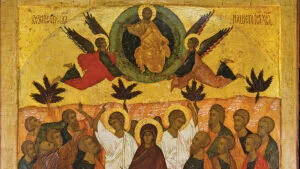It’s ironic that love is the only theological virtue missing in the subtitle of Brad Roth’s book God’s Country: Faith, Hope, and the Future of the Rural Church, because God’s Country is fundamentally a book about love (and, crucially, as we’ll see, not just human love). At one level, you might say the book is a paean of love to rural places and the rural church. Roth puts his cards on the table in the very first line of the book: “I love the rural church” (p. 13). And by the last page, he has moved beyond the personal to the programmatic: “I’m convinced it comes down to this: loving rural people and places, communities and congregations” (p. 219). Love is something all God’s people in the countryside are meant to feel and do.
In between that grand inclusio of affection is a lively, nuanced examination and appreciation of rural places and rural ministry. Again and again in God’s Country, it all comes down to love. Roth’s project is the development of an “ecclesioculture,” the key ingredient of which is love (that’s what makes it distinct from ecclesiology). Ecclesioculture “aims to love the church as we discover it while still dreaming of where God is leading us” (p. 18). Of course, that’s an excellent description of love itself, which is simultaneously patient and restless. Love delights in the beloved as he or she is (not just what we can make them) while also dreaming of what new blessings may yet come to the beloved. God’s Country pursues its goal of ecclesioculture by examining several disciplines through which we may love the rural church: praising, abiding, watching, praying, growing, working the edges, dying, befriending, and dreaming.
Books About the Rural Church
So far, so good. A beautifully-written, thoroughly-researched book by a Harvard-trained rural pastor with years of ministry experience on a couple continents calls for deep, patient, hopeful love of rural people, places, and churches. That’s a book I’m eager to read. If that was as far as God’s Country went, it would fit nicely alongside several other important, recent books that call for attention and affection for rural places and underprivileged people. Sarah Smarsh’s 2018 Heartland: A Memoir of Working Hard and Being Broke in the Richest Country on Earth tells the story of Smarsh’s childhood years in Kansas (the same state where Roth lives and pastors) and the struggles of her lower-class white family, among whom addiction was rampant and for whom resources were few. Smarsh’s unflinching account is full of honesty and also respect and affection for the people and place that formed her. But, speaking of leaving her home, she says: “Like so many young Americans in those years I would have no choice but to leave home if I was going to thrive.”Smarsh, Heartland, 249–50.
Indeed, departure from small places is a major theme in modern American culture. The urgent trajectory of many rural young people is moving away and moving up. In his searing 2019 book, Dignity, photojournalist Chris Arnade describes his highly successful colleagues from the upper strata of American society: “In their minds, staying put is a mistake. If you stay, you limit your career, you limit your wealth, and you limit your intellectual growth. They also don’t fully understand the value of place because like religion, it is hard to measure. What is the value of staying near the family that raised you or in the valley where you were born?”Arnade, Dignity, 152. In Dignity, Arnade seeks to understand, photograph, and describe those who have been left behind (many of them in rural areas). Arnade’s work is an exercise in seeing and therefore an exercise in love. Many of these left-behind people and places feel “mocked and stigmatized by the members of the world who are moving on and up with the GDP.”Arnade, Dignity, 44. In the course of documenting poverty, addiction, and struggle, Arnade comes to see that “most of the people I met were fighting to maintain dignity.”Arnade, Dignity, 44.
Wendell Berry’s fictional character Hannah Coulter reflects on the root and fruit of our cultural restlessness: “The way of education leads away from home . . . The big idea of education, from first to last, is the idea of a better place. Not a better place where you are, because you want to make it better and have been to school and learned to make it better, but a better place somewhere else. In order to move up, you have got to move on.”Berry, Hannah Coulter, 112. But she also considers the very different path taken by her husband Nathan Coulter, who chose to come back home after fighting in World War II, to settle back into his community for good: “I think he gave up the idea that there is a better place somewhere else. There is no ‘better place’ than this, not in this world. And it is by the place we’ve got, and our love for it and our keeping of it, that this world is joined to Heaven.”Berry, Hannah Coulter, 83.
All this to say, I’m glad Brad Roth has written a book on loving and abiding among rural people and places. He’s part of a growing chorus of voices saying something necessary and important here. But, thankfully—and very significantly—God’s Country pushes deeper. Roth’s crucial, enduring contribution is his rooting of ecclesiology in theology, his grounding of the call for human love in the realityBut I also very much want this not be a flash-in-the-pan moment, a ministry fad that fades. of divine love. This is a note that hasn’t frequently been sounded and desperately needs to be. In fact, without it, the rest of the rural ministry tune doesn’t make much sense and won’t last long.
There’s been a significant increase in attention to the rural church over the past several years. New books on rural ministry are being published, new conferences and ministries are being formed, and many small-town/rural pastors have grown more self-aware about the particular type of ministry to which God has called them. I’m excited about these developments. But I also very much want this not be a flash-in-the-pan moment, a ministry fad that fades. If the growing attention to rural ministry is to be useful and enduring, it must be rooted in something deeper than mere cultural interest or the ministry flavor of the month. It must be grounded in God himself. Unfortunately, while the relatively few books written about rural ministry over the past two or three decades have often provided helpful ministry tips and interesting ministry stories, they have not usually done much by way of anchoring rural ministry in theological bedrock.The most pervasively theological book on rural ministry I’ve read is English author Tim Gibson’s 2010 Church and Countryside: Insights from Rural Theology. Gibson argues that the Eucharist, as the “central formational practice of the Church,” shapes the church to minister in rural contexts. As the rural church participates in the Eucharist, it becomes a community that increasingly images the Trinitarian God (p. ix). This transformed community is particularly appealing to residents of rural areas, “since many rural and would-be rural dwellers are attracted to life in the countryside precisely because it promises stronger bonds of mutuality and reciprocity” (p. x). There are some fruitful insights here. But unfortunately, Gibson’s book contains some theologically problematic points, and in any case, few Americans have heard of it or read it.
Love, Theologically Grounded
The present dearth of theologically-rooted approaches to rural ministry is why my heart leapt when I first read Brad Roth’s book (and why it still leaps now on a close re-reading). This book is different. Of course, it’s necessary and important that Roth calls for love of rural places and the rural church, and that he embodies this love in various ministry disciplines. But the really big question is: why ought we to love? And why ought we to keep on loving, even when it’s painful and exhausting and seemingly thankless?
Thankfully, Roth has an answer: “Christ loves the rural church . . . The rural church is a sign of Christ’s commitment to being present with people in all places” (p. 15). Consider these deeply theological words:
The rural church is a sign of the universal church’s identity, for the rural church reminds us that Christ’s body is always off-center, always called toward the margins, always skeptical of the claims of the dominant culture. The rural church represents Christ’s commitment to be among all people everywhere, regardless of the values attributed to them by global centers of power. Christ orients the church toward the edges of society (p. 32).
And this: “The value of a place arises from the fact that it is cherished by the God who created and sustained it. The value of a place is rooted in its nearness to God” (God’s Country, 54).
This is profoundly theological stuff. We’re to love our rural places and people and churches because God loved them first. We’re to keep on loving them because God still does:
The church takes after its self-emptying Savior (Phil 2:7) and stands in contrast to the logic of the world. The church follows the logic of the cross, and thus the church insists on ministering in the most out-of-the-way places, including the villages and open country that make up the anonymous stretches of cornfields between the heaving cities (p. 33).
Roth’s ‘subversive geography’ roots rural ministry in the character, affections, and commitments of God himself. This seminal insight is the most important contribution of God’s Country. It motivates Roth to champion rural ministry without denigrating urban ministry, for if God really is committed to “be with all people, everywhere, through the church” (p. 34), that will of course include city, country, and suburb.This is ecclesiology rooted in theology. It will motivate and sustain ministry in the rural places that desperately need it. It also reminds us that the church wouldn’t even fully be the church without embracing those on the margins, whom God loves. As Dietrich Bonhoeffer said in Life Together, “The exclusion of the weak and insignificant, the seemingly useless people, from a Christian community may actually mean the exclusion of Christ.”
For me, the most compelling idea and image from God’s Country comes early in the book, where Roth contrasts shopping malls (which are found exclusively in cities and suburbs) with the church (which cultivates a presence in the country and everywhere else). Why this difference in location? Roth’s answer is that shopping malls have a commercial purpose, and successful commerce requires the presence of lots of people willing to buy things. But the purpose of the church is to make good on God’s commitment to be with people everywhere, and therefore there must be churches in rural places. The church can’t be the church without the rural church (and the church in other marginal places). This is ecclesiology rooted in theology. It will motivate and sustain ministry in the rural places that desperately need it. And it will do so enduringly, because God’s love for small places will itself endure.
Questions for Brad
Within the context of my deep appreciation for God’s Country, and in the spirit of advancing the conversation on rural ministry, I’d like to pose several questions to Brad, each of them relating to his key insight that rural ministry is to be motivated by human love rooted in God’s own love for the country and for country people.
First, I wonder if Brad thinks God’s own love for the rural church is the key foundation and motivation for rural ministry and the fundamental insight of his book? If there’s anything I’d wish for God’s Country to deliver just a bit more than it does, it would be for the various insightful comments rooting ecclesiology in theology to be more focused and sustained. Throughout the book, there are various insightful comments, often mentioned in passing, that suggest this, but they’re also easy to overlook. On pp. 32–33, Brad speaks about the “logic of the cross”; he speaks of the church’s friendship with rural people expressing “the abiding love of God” (p. 189); he says that we give of ourselves to our communities in solidarity because “God has given himself in Jesus in solidarity with us” (pp. 194–95). I appreciate his decision to organize the book around various disciplines, but I wonder if the overall effect of that organizational scheme, combined with the scattered, cursory nature of the reflections on God’s love, is to emphasize what we’re to do more than what God has already done in Christ. In the course of writing the book, did he consider writing a significant section or chapter more explicitly spelling out God’s love in Christ (in addition to the comments scattered throughout)? I wonder if doing so would provide a theological center of gravity for the book as well as more rocket fuel for rural pastors to live out the disciplines it rightly urges us to adopt.
Second, I wonder about what may be a tension in your book and how that affects its posture toward the urban church. Roth rightly says that the “rural church represents Christ’s commitment to be among all people everywhere,”I hope it will be influential for generations of rural pastors and laypeople in the years to come, just as it has been influential in my own life. and in the same context he says that the church is “always called toward the margins” and that “Christ orients the church toward the edges of society” (p. 32). The first quote implies an equal importance for urban, suburban, and rural ministry, while the second and third may suggest a certain divine preference for the marginal and a certain necessary privileging of rural ministry. How should we think through this tension? Does Roth agree it’s a tension? This relates to an important question regarding rural ministry as we move the discussion forward: how do we best herald the importance of rural ministry without denigrating or minimizing ministry in other places? In the book, Brad didn’t engage with the significant literature that calls for prioritizing urban ministry. Was that a deliberate choice? I chose to engage that literature fairly extensively in A Big Gospel in Small Places, not in order to argue that rural ministry is more important than urban ministry, but to try to level the playing field over against those who seem to insist, or at least imply, that rural ministry is less important.
Third, I have some questions about how God’s love (and ours) for rural places ought to be worked out in practice, specifically regarding the question of when we should or shouldn’t leave them. One of the things I most prize about God’s Country is its nuance, and I’d like to see a bit more of that nuance in the chapter on abiding (ch. 3). Yes, God often does call us to abide rather than to simply move onward and upward, and I’m glad Roth emphasizes this. I learned a lot from this chapter and I applaud its main emphasis. But it would be helpful to reflect more deeply on when it’s okay (and even good) to leave. Is it okay for young people to leave their small towns, as Sarah Smarsh did (and felt she had to do)? And what about pastors? Although Jesus never stops loving particular small towns and never stops abiding there, he sometimes calls rural ministers away from one particular place and to another. How are we to discern when God is calling us away from our current rural ministry location—and how are we to discern whether his call is to another small place or perhaps to a big city? Roth notes in the book that he has served in various locations, and it would be very helpful to hear how he has squared each of his moves with his high valuing of abiding, and how he knew in each case that he was called away from a place in which he knew God would continue to abide.
Brad, I’m grateful for your important book, for its humor and honesty and nuance and theological depth. I hope it will be influential for generations of rural pastors and laypeople in the years to come, just as it has been influential in my own life.








Comments
Be the first one to make a comment!